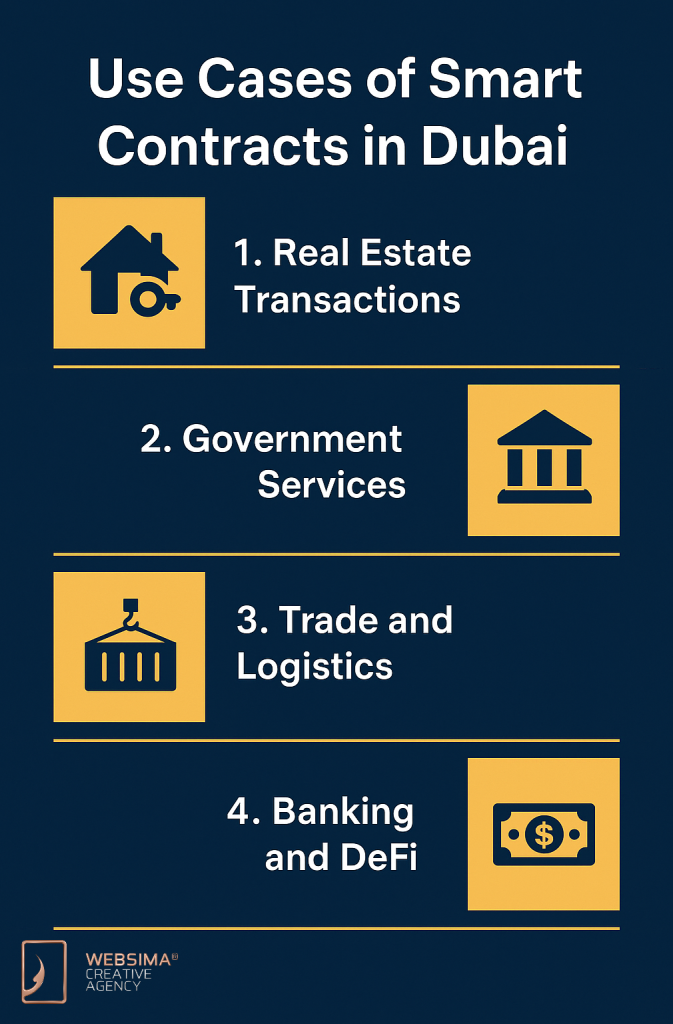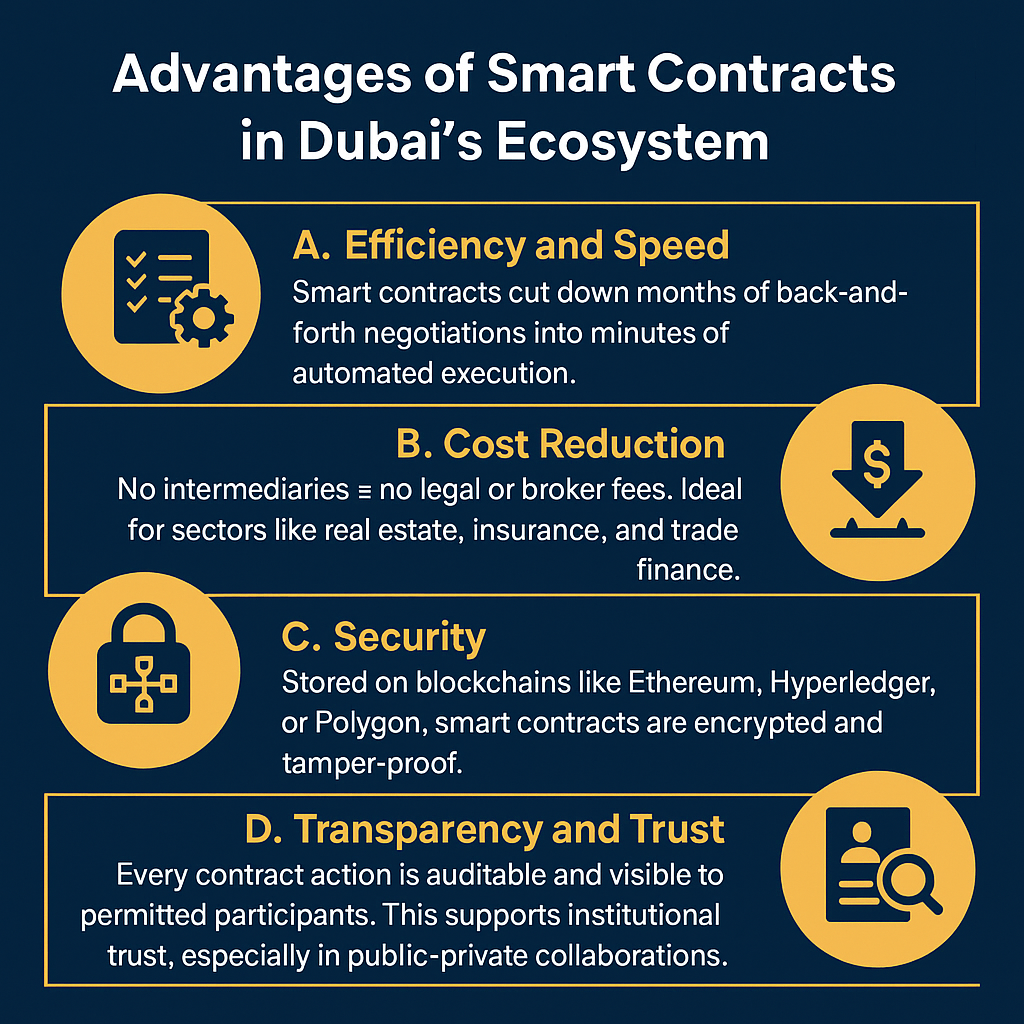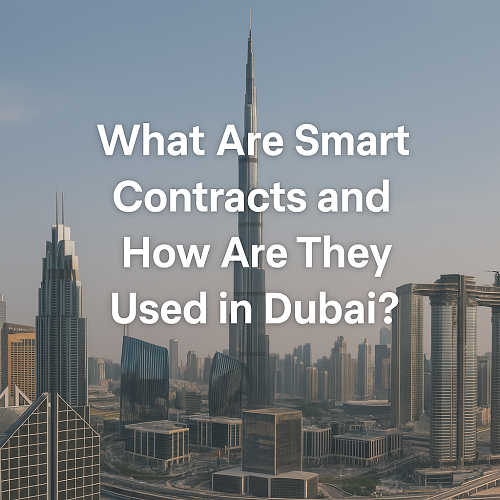Table of Contents
- Introduction: Dubai’s Growing Appetite for Blockchain Automation
- What Are Smart Contracts?
- Legal Landscape for Smart Contracts in Dubai
- Use Cases of Smart Contracts in Dubai
- Advantages of Smart Contracts in Dubai’s Ecosystem
- Challenges and Risks to Consider
- Real-World Case Study: Smart Contracts in Property Management
- Regulatory Bodies Supporting Smart Contracts in Dubai
- Programming Languages & Tools Used
- FAQs about Smart Contracts
- Looking to Build with Smart Contracts in Dubai? Websima Is Here to Help
Introduction: Dubai’s Growing Appetite for Blockchain Automation
Dubai is rapidly emerging as a global hub for blockchain innovation. As part of its Blockchain Strategy 2021, the city has integrated distributed ledger technology into core government and commercial functions. At the center of this revolution lies one fundamental question: What are smart contracts, and why are they crucial to Dubai’s future?
Smart contracts offer a trustless, decentralized, and self-executing alternative to traditional paper-based agreements. In Dubai’s digitization landscape—spanning everything from real estate transactions to trade logistics—they are redefining how business and governance operate.
BREAKING: Dubai partners with Crypto․com to accept crypto for government services! #XRP is the first regulated crypto asset in Dubai! pic.twitter.com/yuxGjTzikY
— JackTheRippler ©️ (@RippleXrpie) May 13, 2025
What Are Smart Contracts?
Definition and Core Principles
A smart contract is a digital agreement written in code and stored on a blockchain. It is self-executing, meaning the contract’s terms are automatically enforced when pre-set conditions are met. Unlike traditional contract, smart contract require no intermediaries such as lawyers, brokers, or notaries.
Key Characteristics:
- Immutable: Once deployed, it cannot be altered.
- Transparent: All parties can see the code and audit its rules.
- Automated: Executes actions based on defined logic.
- Trustless: Operates without reliance on third parties.
For a developer-level breakdown, read the Ethereum Smart Contracts Overview.
Legal Landscape for Smart Contracts in Dubai
Dubai offers a regulatory environment conducive to smart contract deployment:
- Dubai International Financial Centre (DIFC) has established common law-based frameworks that legally recognize digital signatures and smart contracts.
- Abu Dhabi Global Market (ADGM) similarly recognizes smart contracts as legally binding through its Electronic Transactions Regulations 2021.
- Dubai Blockchain Strategy, initiated by the Smart Dubai Office and Dubai Future Foundation, aims to run 100% of applicable government transactions on blockchain.
This legal recognition of smart contracts in the UAE is vital because it ensures enforceability and judicial clarity, which encourages enterprise adoption.
Use Cases of Smart Contracts in Dubai

1. Real Estate Transactions
In terms of smart contracts for real estate transactions in UAE, Dubai Land Department (DLD) integrates smart contracts into platforms like the Dubai REST App, enabling:
- Digital title deed verification
- Instant ownership transfers
- Automated escrow and payment processing
Learn more at Dubai REST – DLD.
2. Government Services
Smart contracts are powering:
- Digital visa and licensing systems
- Automated compliance tracking
- Identity and document verification
Dubai’s Paperless Strategy heavily relies on blockchain-backed automation.
3. Trade and Logistics
Dubai Customs and DP World use smart contracts to:
- Automate customs clearance
- Track cross-border shipments
- Trigger automatic payments on delivery
These efforts reduce friction in global supply chains and enhance transparency.
4. Banking and DeFi
Local banks and fintech startups are experimenting with smart contracts for:
- Automated loan issuance
- Cross-border remittances
- Know Your Customer (KYC) compliance
Explore Smart Dubai’s Blockchain Initiatives.
Advantages of Smart Contracts in Dubai’s Ecosystem

A. Efficiency and Speed
Smart contracts cut down months of back-and-forth negotiations into minutes of automated execution.
B. Cost Reduction
No intermediaries = no legal or broker fees. Ideal for sectors like real estate, insurance, and trade finance.
C. Security
Stored on blockchains like Ethereum, Hyperledger, or Polygon, smart contracts are encrypted and tamper-proof.
D. Transparency and Trust
Every contract action is auditable and visible to permitted participants. This supports institutional trust, especially in public-private collaborations.
Challenges and Risks to Consider
Despite their benefits, smart contracts come with challenges:
• Legal Interpretation Gaps
Though recognized, not all jurisdictions in the UAE fully enforce smart contracts yet. Clarity is stronger within DIFC and ADGM zones.
• Bugs and Exploits
Smart contracts are immutable, so coding errors can’t be reversed. Auditing is essential.
• Oracle Reliability
When contracts rely on external data (weather, stock prices, etc.), faulty oracles can trigger unintended outcomes.
• Lack of Skilled Developers
Smart contract programming (in Solidity or Vyper) requires highly specialized skills, which are in short supply locally.
Real-World Case Study: Smart Contracts in Property Management
Company: Ejari (regulated by RERA)
Solution: Ejari leverages smart contracts to allow tenants and landlords to register, renew, and manage lease agreements digitally.
Impact:
- 3x faster processing time
- Elimination of forged tenancy documents
- Integration with DLD and DEWA for unified compliance
Regulatory Bodies Supporting Smart Contracts in Dubai
- Dubai Land Department (DLD) – Real estate smart contract frameworks
- Real Estate Regulatory Agency (RERA) – Tenancy and brokerage automation
- Virtual Assets Regulatory Authority (VARA) – Smart contract-based crypto platforms
- Dubai Financial Services Authority (DFSA) – Regulates DeFi and smart contracts in DIFC
These institutions collectively form a trusted environment for blockchain experimentation.
Programming Languages & Tools Used
Developers in Dubai primarily use:
- Solidity: The most common smart contract language on Ethereum
- Vyper: A more secure and readable alternative to Solidity
- Hardhat / Truffle: Development environments for deployment and testing
- Chainlink Oracles: For integrating real-world data
FAQs about Smart Contracts
1. Are smart contracts legal in Dubai?
Yes, especially in DIFC and ADGM, which recognize electronic contracts as legally binding.
2. What industries in Dubai use smart contracts?
Real estate, fintech, logistics, legal tech, government, and trade.
3. Can individuals use smart contracts in Dubai?
Yes, but they may require a verified digital identity and access to compatible platforms.
4. What platforms are most used in Dubai?
Ethereum, Polygon, and Hyperledger are popular among government and enterprise pilots.
5. Can smart contracts be edited after launch?
No—unless a proxy contract is used. Once deployed, smart contracts are immutable.
Looking to Build with Smart Contracts in Dubai? Websima Is Here to Help
Dubai is not just adopting blockchain technology—it is institutionalizing it. If you’re a startup founder, fintech leader, or real estate developer wondering how to integrate smart contracts into your platform, Websima is your ideal partner.
We specialize in:
- Smart contract development and auditing
- Blockchain legal compliance under UAE regulations
- Tokenomics design and integration
- Custom Web3 and NFT systems tailored for Dubai’s market
Let us help you navigate both the technical complexities and regulatory frameworks so you can deploy smart contracts with confidence.
Contact us today and begin your journey into Dubai’s blockchain economy.





